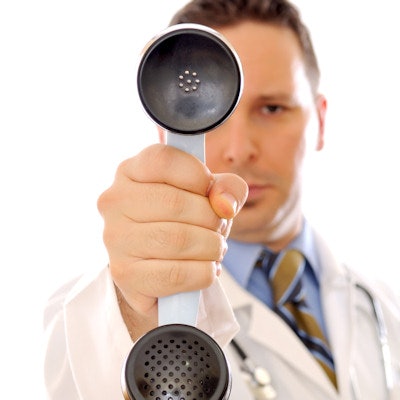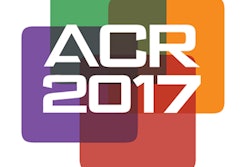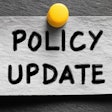
Do you feel like you spend too much time on the phone talking to referring physicians? If so, think again: Clinicians actually value phone time with radiologists, according to a new study that found diverging opinions between radiologists who think their calls are excessive and referring physicians who appreciate the direct communication.
In research presented at the American College of Radiology (ACR) annual meeting last month in Washington, DC, approximately half of surveyed radiologists felt they made too many calls, while none of them felt the rate of communication was insufficient. In contrast, only 1.3% of referring physicians thought the frequency of direct communication was excessive, and the vast majority felt the rate of calls was either appropriate or they desired more contact.
 Dr. Zeeshaan Bhatti from the University of Michigan Health System.
Dr. Zeeshaan Bhatti from the University of Michigan Health System."There are certain benefits of communicating emergent results directly," said presenter and lead study author Dr. Zeeshaan Bhatti, a radiology resident from the University of Michigan Health System. "But it was unclear to me whether clinicians appreciated our phone calls or were rolling their eyes at the disruption on the other end of the line for nonemergent findings."
I just called to say ...
Bhatti initiated the study after reflecting on how during his intern year, when he was caring for hundreds of patients with various ailments, he never received a phone call from a radiologist about an abnormal result. When he informally polled his colleagues about their intern experiences at other institutions, they also reported that they rarely, if ever, heard from a radiologist regarding an abnormal finding.
To understand the perceptions of radiologists' communications, Bhatti and colleagues emailed an anonymous survey to 364 referring physicians and 44 radiologists -- all residents -- at the University of Michigan Medical Center. The questions asked about the frequency, indication, clinical utility, and methods of direct communication of radiology test results. Replies were received from 148 clinicians (41%) and 37 radiologists (84%). The researchers also separated the responses between internal medicine, emergency medicine, and surgery residents at the University of Michigan.
Interestingly, a majority of the surveyed referring physicians heard from radiologists at least a couple of times a week regarding abnormal results. In addition, 16 emergency medicine residents (59%) said they receive radiologists' calls on a daily basis.
| Frequency of phone calls from radiologists for abnormal results | |||
| Frequency | Surgery residents | Emergency medicine residents | Internal medicine residents |
| Never | 1 | 0 | 0 |
| Couple of times per year | 9 | 0 | 3 |
| Couple of times per month | 17 | 1 | 28 |
| Couple of times per week | 12 | 10 | 31 |
| Daily | 1 | 16 | 2 |
"And it was not only about abnormal test results," Bhatti said. "We were making calls about study protocols, whether they want contrast or not, whether they want to do a mesenteric protocol or a gastrointestinal bleed protocol."
Calls regarding study protocols were less frequent. Among the surveyed internal medicine residents, 38 (60%) said they receive calls from radiologists a couple of times a month, while 19 (29%) get a call only a couple of times per year.
| Frequency of phone calls from radiologists for study protocols | |||
| Frequency | Surgery residents | Emergency medicine residents | Internal medicine residents |
| Never | 1 | 0 | 0 |
| Couple of times per year | 17 | 2 | 19 |
| Couple of times per month | 18 | 12 | 38 |
| Couple of times per week | 3 | 10 | 6 |
| Daily | 1 | 3 | 1 |
From the perspective of the radiologists who were surveyed, 21 (58%) said they often call clinicians with results even when they know the referring providers are aware of the findings. Nine (25%) said they call infrequently under those circumstances.
Radiology residents were evenly split, at 18 each (50%), in terms of believing the frequency of calls to clinicians with test results was either too much or appropriate. No one thought there should be more communication.
On the other hand, 52 internal medicine residents (81%), 29 surgical residents (72%), and 19 emergency medicine residents (67%) thought the frequency of radiologist calls was appropriate. Only two referring providers (1.4%) indicated that the frequency of direct communication was excessive, while a total of 30 (23%) desired more communication.
In cases of nonemergent findings, 122 referring providers (82%) said they prefer to receive a phone call even when the radiologist's report is available in a timely manner.
Annoying or necessary?
So what is the value of radiologists making these phone calls? And are their efforts appreciated or disruptive?
"Obviously, if there is an emergent finding, then it is important to call," Bhatti said. "Sometimes we were calling [clinicians] to let them know something they were already aware of or calling to let them know that the study was negative," which Bhatti himself thought was excessive and seemingly unwarranted.
Bhatti suggested that radiologists and clinicians should consider phone calls in the same light as they do reviewing a patient's chart, assuming the communication is warranted.
"Medicine is not determined by what is convenient; much of what we do in our practice is not convenient," he said. "Medicine is about patient care, even if it is not convenient. Making the diagnosis is one part of the job, but communicating the diagnosis is an equally significant part of our job."
There are also some ancillary benefits to communicating and sharing findings, such as medicolegal protection. Bhatti cited a 2013 survey conducted by the American College of Radiology that found that 23% of radiologists were involved in at least one communication-related malpractice lawsuit.
Another study from the University of Michigan found that in-person meetings with the acute care surgery team led to changes in patient management in 43% of cases and changes in operative management in 90% of cases.
"I think we all recognize that communicating will offer some medicolegal protection and that communicating is important to understanding what is going on with the patient," Bhatti said. "Communication is a good thing. Patient safety is at stake."


















